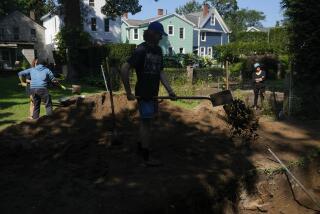Tracing the Roots of Black Ancestors
- Share via
“The DAR Library is special in terms of black genealogical research,” Alex Haley said in his “Preserving the Family” address last fall to the Daughters of the American Revolution’s 93rd Continental Congress.
He went on to explain how in the antebellum period on the big plantations a well-trained mistress’s job included taking inventory. It was an annual chore, and the listing included every piece of equipment on the plantation--from the dishes to plows, wagons, mules and an accounting of every slave.
Haley noted that researchers might find information pertaining to their ancestors in these records at the DAR Library. Sometimes a mistress made detailed references about the house slaves and yard slaves (those were the designations), even to describing their personalities. The DAR Library in Washington has an expanding collection of valuable genealogical manuscripts such as these plantation inventories.
Plantation Inventories and Records For those researching their black families, plantation inventories and other such records can be invaluable. But genealogists soon become frustrated because few of these records are indexed. That makes them costly to search in terms of time and money.
The Registry of Black American Ancestry in Salt Lake City is now off the drawing board with Johni Cerny (co-author of “The Source”) as president. Leonard Smith is co-director of the new organization.
It was established to:
--Assist novices and professionals in compiling black American histories and genealogies.
--Develop black genealogical research by locating, acquiring and indexing records pertaining to slaves and free blacks in America.
--Create a computer file of black American families.
--Make all its compiled information available to the public for a reasonable fee.
--Establish a limited library of genealogical books, films and research sources for use by the public.
Registry’s Plans Planned activities and projects of the registry scheduled for implementation in the first year of operation include:
--Registration and collection of oral histories of elderly black Americans.
--Obtaining and computerizing the Bolton & Dickens Slave Trade List of more than 1,500 slaves from the New York Historical Society and the Hector Davis & Co. Slave Trade Lists from the Chicago Historical Society.
--Purchase of microfilm copies of the Freedman’s Bureau records and computerizing the genealogical material.
--Setting up a computer file of black family groups submitted by amateur and professional genealogists and the general public, enabling individuals and researchers to search this computer file for a nominal fee.
--Publication of black ancestral lineage books. The registry will accept lineage charts from the public for publication in lineage books to be sold to libraries, genealogical societies and individuals.
Future Plans and Projects Long-range plans and projects include:
--Compiling a computerized index of all slave owners in the 1850 and 1860 U.S. Slave Schedules.
--Indexing names of blacks listed in the 1890 Special Census of Civil War Veterans.
--Computerizing manumission records available for all counties in all states.
--Computerizing all plantation records and diaries available on microfilm and microfiche.
--Computerizing marriage records of blacks for all states that kept segregated records, as well as those that identify blacks in general registers.
--Computerizing all court records involving blacks, especially the segregated records in the Southern states.
--Indexing names of free blacks enumerated in the 1800, 1810, 1820 and 1850 censuses.
--Indexing names of all blacks in the 1870 census for the slave states.
--Computerizing vital records of blacks found in family Bibles and diaries.
--Compiling an atlas of plantation boundaries, indicating plantation owners by name and the dates during which they owned the property.
Many of these projects will take years to complete. If you need help now, check your library for “The Source” and read Johni Cerny’s “Black Ancestral Research.” It is Chapter 19 in this eminent guidebook of American genealogy, which was published last year.
More to Read
Sign up for Essential California
The most important California stories and recommendations in your inbox every morning.
You may occasionally receive promotional content from the Los Angeles Times.













